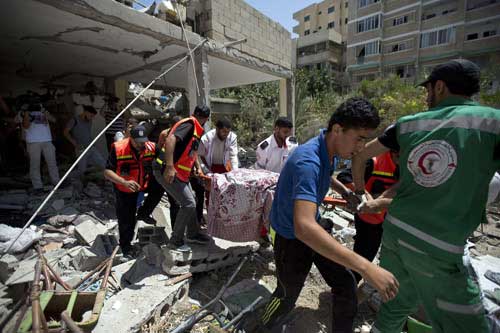Australia/Israel Review
Scribblings: The price of a gross over-reaction
Aug 25, 2014 | Tzvi Fleischer

Tzvi Fleischer
There have been a lot of costs to the over-the-top reaction among many commentators, activists and political leaders to the undoubtedly tragic situation in Gaza over recent weeks. The inability of so many to view the confronting and emotive images coming out of Gaza with some perspective is something likely to cause a series of severe negative consequences – and not just for Israel.
The most obvious consequence of extreme and emotive reactions to the war in Gaza is the encouragement and licensing of antisemitism on a scale unheard of since the 1940s. We have witnessed what can only be called attempted pogroms in France. In much of Europe, it is simply unsafe to be visibly Jewish in many urban areas. And while there has been some awareness and counter-reaction to of all this, political and social leaders in Australia and elsewhere are still not dealing with it on the scale it requires.
The reaction to the war has arguably essentially licensed terrorism – primarily through misuse of the international law concept of “proportionality.” As I noted last month, this concept has nothing to do with casualty ratios, or even raw casualty numbers from a campaign as a whole – yet this is how it has overwhelmingly been employed with respect to Gaza. The net effect of these complaints is in essence to say that Israel has no effective right of self-defence when a terror group fires missiles at its civilian towns while embedded amongst a civilian population.
Critics say in principle it does – but only if it does not cause supposedly “disproportionate” casualties among the surrounding civilians when striking back. Yet these critics generally have no practical suggestions for how this can be done, meaning effectively there is no right of self-defence at all.
Terror groups thus will find it an unanswerable tactic in future to duplicate Hamas’ double war crime of attacking civilians while hiding among civilians. Their victims will be damned if they don’t respond and damned if they do – while terrorists won’t care if they’re breaking international law to put their enemies in this bind.
Meanwhile, advancing Israeli-Palestinian peace is also being made vastly more difficult by the international reaction to the Gaza war. When Israel withdrew every soldier and settler from Gaza in 2005, critics of the move predicted that Gaza would become a launching ground for terrorism. Proponents of withdrawal answered that if this happened, Israel would have the right – and also international legitimacy and understanding – to fight back as hard as necessary to stop such attacks, given the complete withdrawal which had taken place.
It is now clear they were wrong on this point. Israel absolutely does not have international understanding of its need to fight back, even though it was the victim of unprovoked aggression from Gaza. This makes any Israeli withdrawal from the West Bank much more difficult, given that the West Bank is much closer to Israel’s major population centres and vitally important strategic infrastructure like Ben Gurion Airport. In the wake of the Gaza experience, it frankly would be foolish for any Israeli political leader to contemplate a withdrawal from all or most of the West Bank without completely ironclad security guarantees – which the Palestinian leadership will find almost impossible to grant. Based on the Gaza experience, he or she could certainly not trust that future Palestinian leaders would stop armed groups from firing rockets or launching terror attacks that would severely affect ordinary everyday life for the majority of the Israeli population. Nor could he or she expect any international understanding if it became necessary to take military action to deal with the threat – only condemnations and allegations of war crimes.
There is one more profoundly negative effect of the exaggerated reaction to the Gaza conflict and it is particularly worrying in the moral sense. This conflict has seen a significant cheapening of concepts essential for maintaining a shared moral horror of the most serious and grave international crimes – especially the concept of genocide.
I have been truly shocked by the number of ostensibly non-bigoted nor insane commentators, activists, and celebrities who have been willing to endorse the blatantly factually ridiculous charge that the conflict in Gaza amounted to “genocide” of Palestinians by Israel. (Of course, on top of this are the even more morally indefensible comparisons of Gaza to the Holocaust. )
Even if you accept as gospel the figures alleging close to 2,000 Palestinians have died in the current conflict, of whom it is claimed some 80% are civilians – figures which ultimately come from the Hamas controlled Health Ministry in Gaza and are therefore dubious in the extreme (see pp. 18-19) – there is simply no way to mount a serious argument that this amounts to “genocide”. Genocide means mass killing or other acts “committed with intent to destroy, in whole or in part, a national, ethnical, racial or religious group.” There are perhaps 10 million Palestinians in the world, and around 1.8 million in Gaza. Even if you think Israel killed 1600 Palestinian civilians and, in the face of overwhelming evidence to the contrary, did so deliberately, it is crazy to argue that this amounts to an effort to “destroy” all Palestinians in Gaza.
A much larger percentage of the civilian population was killed during the US-led battle of Fallujah in Iraq in 2004 – around 800 out of 300,000 residents. No one said that was “genocide.”
Those who throw around this term because it is emotionally satisfying, or because they think it serves their cause, need to stop and think about what they are doing. If they really cared about the prevention of future genocide, they would not do this. Because if everything is “genocide”, nothing is.
Tags: Israel






